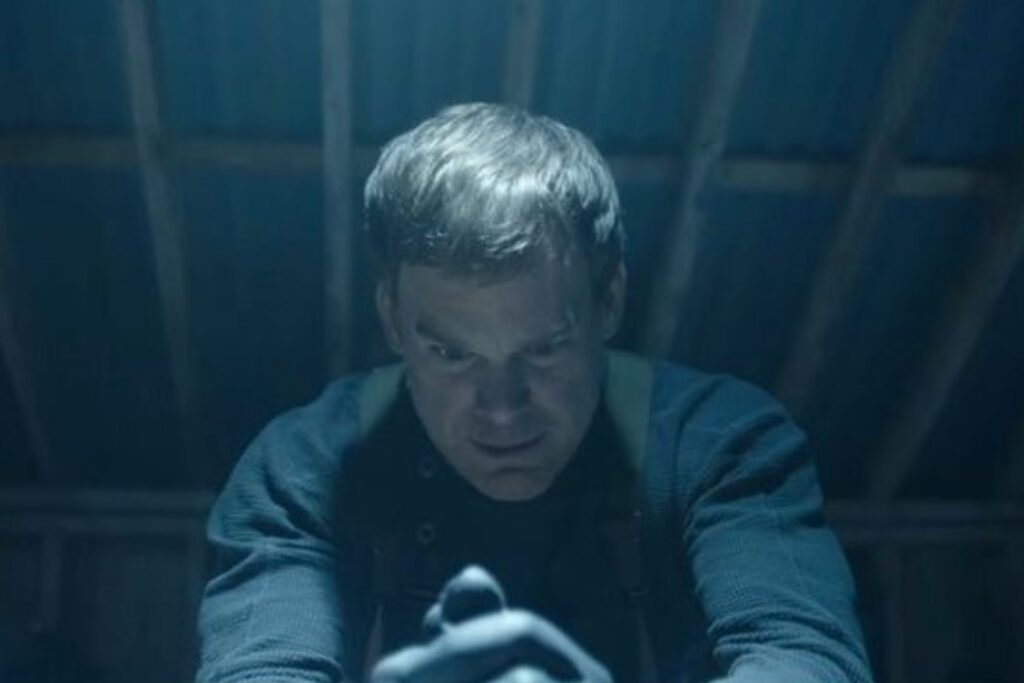REVIEW: Dexter: New Blood
Dexter: New Blood is Showtime’s attempt to bring back their acclaimed show, resolve the open ending, and fix the many issues fans had with the original finale. This sequel show was received with lackluster ratings and middling views, as reported by TV Series Finale and other sources.
The original Dexter’s premise was simple, playing off America’s fascination with True Crime and the popularity of anti-hero stories that rose to prominence in the 2000s and 2010s. Despite Dexter’s popularity and intelligent writing, the studio failed to stick the landing. Some fans hated the entire final season, and some just hated the last 30 seconds of the finale. Many wished they had faded to black when the Slice of Life wreckage washed ashore and that Dexter had stayed dead. Those who went into Dexter: New Blood hopeful for a satisfying resolution to Dexter’s story yet fearful of it coming to light in current-day Hollywood experienced a half-realized premise, all in service of the ending. Much of the critical build-up to set up that ending was left on the wayside as the final scene took precedence over all other factors of a compelling narrative.
*SPOILERS*
Dexter: New Blood picks up ten years after the original show’s finale, where Dexter has resisted his killer instincts for nigh a decade and is living happily in a small New York town with a healthy relationship and a stable job. When a privileged hothead, Matt Caldwell, kills a mythical white buck that Dexter has a spiritual attachment to, Dexter loses control and takes his first life in ten years. Struggling against rusty skills and an enclosing police investigation, Dexter must cover up his crime and cool the rage of Matt’s father, Kurt.
To exacerbate the situation, Dexter’s estranged son, Harrison, appears in town suddenly, seeking to reconnect with his father. Dexter must confront his past, strive to be a good father, and prevent getting caught while maintaining the stable life he has managed to achieve. Only when Kurt reveals himself as a fellow long-running serial killer does Dexter open up to Harrison and introduce him to his vigilante world.
Despite his best efforts, Dexter’s true identity is exposed, and the law closes in, ushering in a very personal finale where Dexter must choose between his old life and his new relationship with his son. In the fallout, Harrison chooses his humanity; he kills his father to protect the world from his dark passenger, ending the show with Dexter dead and Harrison on the run.

The show’s point was clear: it existed solely to kill Dexter; nothing beyond that mattered. The supporting cast, setting, plot, and charter arcs were dismissed in service of that singular idea, leaving a mostly empty entertainment experience. Most online fans agree that death is the best end for Dexter, but a death properly foreshadowed and delivered satisfyingly, preferably in the act of redemption. This season brought nothing to the story of Dexter and existed solely to kill him.
Despite a respectable Rotten Tomatoes score from both fans and critics, a more in-depth look at the audiences’ reviews reveals a general apathy for the show and an outright dislike for the finale. A disgruntled fan wrote:
“It was really badly written and felt like fan fiction written by a 14-year-old. Harrison (Jack Alcott) was great, and so was his story line, but everyone else was miscast. They had a chance to redeem themselves after a weak ending to the original series, but they botched it and just replaced one bad ending with another.”
This review is highly indicative of the overall reception to this new season — a fair attempt with an intriguing premise but poor execution and a disappointing resolution left fans wanting more.

The kill scenes were still visceral, successfully gaining us an in-depth investigation of Dexter’s mind. Despite that, something was missing: a gravitas or intensity in the story’s tone. It is always challenging to bring back an old show, and these writers were trying, successfully bringing part of the show’s spirit back to life. However, it lacks the underlying intelligence that defined the previous show. If audience members can connect with the father-son relationship, they might see past the thin plot and cheap motivation to enjoy the story.
For those concerned with the political nature of current-day Hollywood, the show did not drift too far into being absorbed with real-world politics. A few “woke” lines appear in each episode, but they do not derail the overall story or character dynamics. If anyone struggles to invest in the father-son relationship, the woke lines will stick out and distract a lot more than they otherwise would. The political aspect is not dominant and can be overlooked.
Harrison was complicated. One moment, he was annoying, selfish, and spoiled. Then, in the next, the actor would deliver a compelling performance that drew the audience in to feel for his plight. Jack Alcott did a decent job portraying an adolescent psychopath going down a path toward becoming a serial killer. His inclusion in the show was essential, but he was written and acted very inconsistently, making it difficult to connect with him.

Notwithstanding an empty script and a lackluster supporting cast, the actors from the original series shone beautifully, still capturing the audience with mesmerizing performances that brought the tone of the original show back to life. Jennifer Carpenter as Debra, especially, returned strong, delivering a haunting performance. Despite her death in Dexter’s final season, the writers correctly decided to bring her back as Dexter’s dark passenger, her character perfectly depicting Dexter’s change over the past decade.
The other side characters fulfilled their purpose in the story but did not stand out all that much. Kurt was an intimidating villain, and the actor was competent in portraying a menacing antagonist, yet he was very 2-dimensional, just being generically evil.
The surprising stand-out character was the high school wrestling coach and police officer, Logan. He invoked the classic stereotypical high school coach and showed genuine caring for his players, including Harrison, and that connection was vital to Harrison’s decision to kill Dexter in the finale.
Audrey, Chief Bishop’s daughter, was a lot like Harrison, in that one minute she was annoying, selfish, and spoiled, and the next, her relationship with Harrison and her mother carried her scenes. She was often used as a vehicle for the few “woke” lines, driving down her likability. Despite that, the actress struggled successfully to bring a compelling performance from the empty character that she was given from the scripts.
The weakest addition to the show was Molly Parker, a True Crime podcaster investigating the disappearance of Matt Caldwell and later the infamous Bay-Harbor Butcher. Her character constantly spewed hate and progressively discriminatory lines in all her scenes, showing very little intelligence to explain her status in an investigation sphere. She was completely unnecessary in the story. The chief would have figured it all out in the end without her contributions. She was just in the show to spout woke lines and put a face on Kurt’s recently killed victims. The writers should have spent more time with any of the other recent victims to accomplish the same thing.

Michael C Hall is a phenomenal actor and deserves far more work than he gets. He lives and breathes Dexter, becoming his character far better than the majority of Hollywood actors. Besides Debra, Dexter was the best part of the show. He still brilliantly captures the audiences’ attention and gives us a personal view of Dexter’s struggles. His performance was nearly enough to carry the show. However, the empty scripts still failed him, preventing him from having a satisfying character arc. He went from, “I’m a good person,” to, “OK, kill me. I’m evil now.” It was not a gradual change at all.
Dexter: New Blood was a disappointing addition to the Dexter lore, bringing nothing to interest new fans and not resolving the remaining story threads in a satisfying manner for returning viewers.
Dexter: New Blood
Plot - 3.5
Acting - 6.5
Progression - 3
Production Design - 6.5
Resolution - 2.5
4.4
Awful
A fair attempt to bring back a beloved show that fails to deliver a satisfying ending despite 8 years to prepare.







